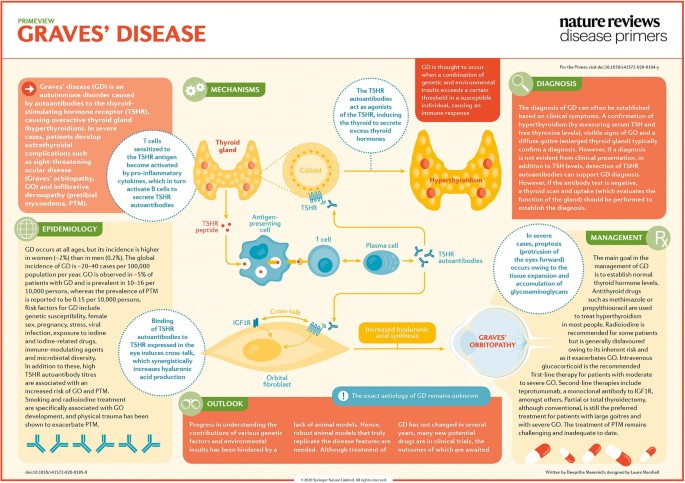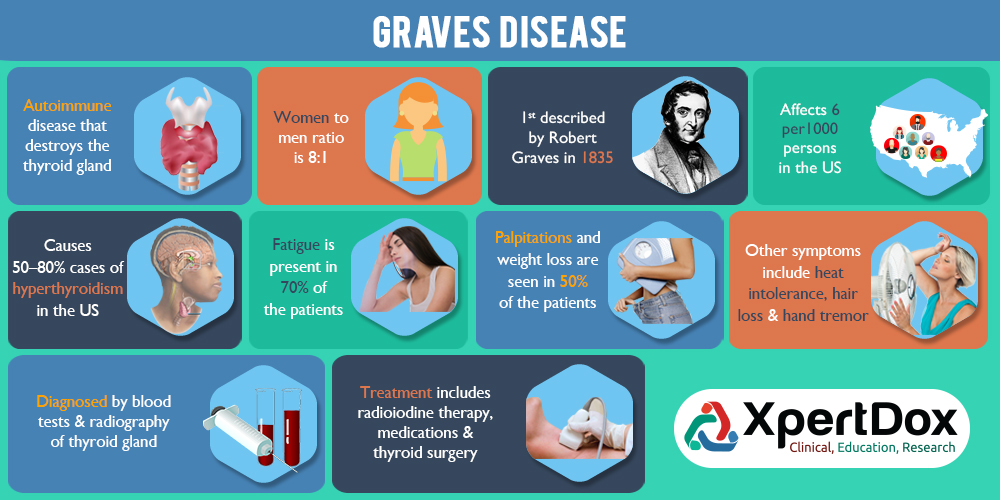Uncover the mysterious triggers behind Graves Disease, exploring the factors that set off this chronic autoimmune disorder. Don’t miss out!
Table of Contents
Introduction to Graves’ Disease
Graves’ disease is a type of illness that affects the thyroid, a small gland in the neck. This disease is classified under autoimmune disorders, which means that the body’s immune system mistakenly attacks its own tissues. In the case of Graves’ disease, the immune system specifically targets the thyroid gland, causing it to become overactive.
What Is Graves’ Disease?
The thyroid gland plays a crucial role in our bodies by producing hormones that regulate various functions like metabolism, energy levels, and body temperature. When the thyroid becomes hyperactive due to Graves’ disease, it can lead to a range of symptoms that impact a person’s overall well-being.
Why the Thyroid Matters
Think of the thyroid as a little engine that helps keep our bodies in balance. It helps us have the energy we need to play, learn, and grow. If the thyroid isn’t working right, we might feel tired all the time or too warm, even when it’s not hot outside.
Autoimmune Disorders Simplified
Autoimmune disorders are like friendly fire – the body’s defense system, which usually fights off germs to keep us healthy, gets confused and starts attacking its own cells. In Graves’ disease, this mix-up happens with the thyroid gland, causing the problems we discussed.
Recognizing Graves Disease
Graves’ disease is a type of illness that affects the thyroid, which is a small gland in your neck. This condition is a part of autoimmune disorders, meaning that your body’s defense system mistakenly attacks your own thyroid.
What Does Hyperthyroidism Look Like?
When someone has Graves’ disease, they may experience symptoms of hyperthyroidism. These can include feeling too warm, having a fast heartbeat, or feeling jittery. It’s like your body’s engine is running too fast!
Thyroid Eye Disease for Kids
In Graves’ disease, the eyes can be affected too. Thyroid eye disease can make someone’s eyes look bigger than usual. This happens because the muscles and tissues around the eyes swell up. It’s important to talk to a doctor if you notice any changes in your eyes if you have Graves’ disease.
What Causes Graves’ Disease?
Graves’ disease is caused by a mix-up in the body’s immune system. When we get sick, our immune system fights off germs to keep us healthy. But sometimes, it mistakenly attacks our own body instead of just the germs. In Graves’ disease, the immune system targets the thyroid gland, a small, butterfly-shaped organ in the neck that helps control our energy levels and body temperature.

Image courtesy of www.nature.com via Google Images
Immune System Confusion
Imagine your body’s immune system like an army that guards your body. Normally, this army knows who the enemy is (germs) and who their friends are (your own body). In Graves’ disease, though, some soldiers in this army get confused and attack the thyroid gland. This leads to the gland making too much thyroid hormone, causing symptoms like feeling too warm, having a fast heartbeat, or being jittery.
The Endocrine System’s Role
Now, let’s talk about the endocrine system. This system works like a messaging network in your body, sending out signals to different organs to tell them what to do. The thyroid gland is part of the endocrine system, and when it gets attacked in Graves’ disease, it can disrupt this messaging system. This disruption can lead to symptoms of hyperthyroidism and other complications related to the endocrine system.
Living with Graves’ Disease
Living with Graves’ disease can be challenging, but with the right care and management, you can still lead a happy and healthy life. Let’s take a look at what it might be like for someone with Graves’ disease every day, and how they can handle it.
A Day in the Life
For kids with Graves’ disease, some days might feel different than others. You might feel more tired or have trouble concentrating. Some kids might notice that their hearts beat faster than usual, or they feel warmer than everyone else. If you have Graves’ disease, you might visit a special doctor called an endocrinologist who helps take care of your thyroid gland.
| Trigger | Description |
|---|---|
| Genetics | Having a family history of Graves Disease can increase the likelihood of developing the condition. |
| Autoimmune response | The immune system mistakenly attacks the thyroid gland, leading to an overproduction of thyroid hormones. |
| Stress | High levels of stress can trigger or exacerbate Graves Disease symptoms. |
| Smoking | Smoking has been linked to an increased risk of developing Graves Disease. |
| Gender | Graves Disease is more common in women than in men, suggesting hormonal factors may play a role. |
Staying Healthy and Happy
To stay healthy and happy while living with Graves’ disease, it’s essential to follow your doctor’s advice carefully. Taking any prescribed medications regularly and going to all your doctor’s appointments is crucial. Eating a balanced diet and getting enough rest can also help you feel your best. If you have Graves’ disease, make sure to talk to your parents, teachers, and doctors about how you’re feeling so they can support you.
How Is Graves’ Disease Treated?
When someone is diagnosed with Graves’ disease, doctors have different ways to help them feel better. One common treatment is giving the person specific medicines. These medications can help control the overactive thyroid and bring it back to normal levels. By taking these pills, the thyroid can start working the way it should, making the person feel much better.

Image courtesy of www.deviantart.com via Google Images
In some cases, when the medicines don’t work as expected or if there are complications, the doctor might suggest other treatments, like radioactive iodine therapy. This special treatment involves swallowing a tiny pill that has radioactive iodine inside. The radioactive iodine goes straight to the overactive parts of the thyroid and helps them calm down. It’s like a tiny superhero pill that fights the bad stuff in the thyroid and helps it act normal again.
In rare and severe situations, surgery might be needed. If the thyroid is too large or if it’s causing major problems, the doctor might suggest removing all or part of it. Don’t worry, though – the thyroid won’t be missed too much because people can still live a healthy life even without it. And if the whole thyroid is taken out, the person will need to take special medicine every day to make up for what the thyroid used to do.
Summary: Understanding Graves Disease
Graves’ disease is an illness that impacts the thyroid, a small gland in the neck. This condition is a type of autoimmune disorder, which means that the body’s immune system mistakenly attacks its own thyroid. The thyroid plays a crucial role in our bodies by helping us have energy and regulating our body temperature, making proper thyroid function vital for overall health.
Recognizing the Signs of Graves’ Disease
When someone has Graves’ disease, they may experience symptoms of hyperthyroidism. This can include feeling too warm, having a fast heartbeat, or feeling jittery. Additionally, some individuals with Graves’ disease may develop thyroid eye disease, which can cause their eyes to appear larger than usual.
Potential Causes of Graves’ Disease
Graves’ disease is often linked to autoimmune disorders, where the immune system mistakenly attacks the thyroid. Genetics can also play a role in the development of this condition. The endocrine system, which serves as the body’s chemical messenger network, is involved in Graves’ disease as well.
Living with Graves’ Disease
For individuals with Graves’ disease, managing the condition is a part of their daily life. This can involve visiting doctors regularly and following treatment plans to keep their thyroid functioning correctly. By staying active, eating well, and taking prescribed medications, individuals with Graves’ disease can lead healthy and happy lives.
How Graves’ Disease is Treated
Doctors have various ways to help individuals with Graves’ disease feel better. Treatment options may include medications to regulate the thyroid’s function or, in some cases, surgery to correct any issues. By following their doctor’s advice, individuals can effectively manage Graves’ disease and its symptoms.
Frequently Asked Questions (FAQs)
Is Graves’ Disease Contagious?
Graves’ disease is not contagious like a cold or the flu. You cannot “catch” it from someone else. It is actually an autoimmune disorder, which means the body’s immune system mistakenly attacks the thyroid gland in the neck.
Can Kids Get Graves’ Disease?
While it is not very common, kids can develop Graves’ disease. It is important to know that doctors can help kids with Graves’ disease feel better and manage their symptoms. If any signs or symptoms are noticed, it’s essential to speak to a healthcare provider for proper evaluation and treatment.
Will Graves’ Disease Go Away on Its Own?
Graves’ disease typically does not go away on its own. It is a chronic condition that needs proper diagnosis and treatment. Doctors can help provide different options like medication or, in some cases, surgery to help control the symptoms and keep the thyroid working correctly. Early detection and management are key in effectively handling Graves’ disease.
Generated by Texta.ai Blog Automation





